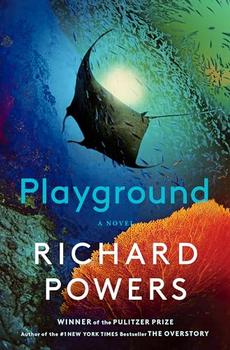Book Club Discussion Questions
In a book club? Subscribe to our Book Club Newsletter and get our best book club books of 2025!
For supplemental discussion material see our Beyond the Book article, The History of Go and our BookBrowse Review of Playground.
Please be aware that this discussion guide will contain spoilers!
These are original discussion questions written for BookBrowse.- What did you know about French Polynesia or Makatea before reading the book?
- Other than the four primary characters, who stood out for you and why?
- Is there a quote from the book that you found particularly meaningful?
- What surprised you about the book? Did you learn anything new from it?
- Both Todd and Rafi were inspired by books. Why do you suppose that was? Do you think the reason was the same for each? Have you had a similar experience regarding a specific book?
- In his essay to St. Ignatius, Rafi writes, "Without the ability to feel sad, a person could not be kind or thoughtful, because you wouldn't care or know how anybody else feels. Without sadness, you would never learn anything from history. Sadness is the key to loving what you love and to becoming better than you were. A person who never felt sad would be a monster." Do you agree with him about the role of sadness in one's life? Why or why not?
- Rafi and Todd each had a father who pushed them. In what ways do you think their actions helped their sons, and in what ways do you think they damaged them?
- What did you think of the author's descriptions of the ocean and its creatures? If you've had experience with the sea (diving, snorkeling, etc.), do his depictions match what you've seen?
- What was your opinion of Evelyne's career, her marriage and her relationship to her children? Do you think the choices she made were reasonable given the era? Were you surprised at Bart's acceptance of his role in her life?
- Did any of the Makateans' votes surprise you? If you'd been on Makatea, how do you think you'd have voted and why?
- When Evelyne is 12, her father throws her into a pool to test his invention, the aqualung. Later Evelyne speculates that his real motivation was to give her confidence. What did you think of his actions? Do you agree with her assessment?
- Evelyne writes about the underwater habitats that people were experimenting with in the late 1950s and 1960s. Had you heard of any of these, such as Cousteau's Conshelf, the U.S. Navy's Sealab or Tektite, the collaboration between General Electric and NASA? Why do you suppose this sort of habitat hasn't been more thoroughly explored as an option for humanity? Do you believe that's likely to change?
- Todd thinks, "We make things that we hope will be bigger than us, and then we're desolate when that's what they become." What do you think of this statement? Do you believe he's right?
- Evelyne passes on a bit of "Quebecoise wisdom to Bart: "Attache ta tuque et lache pas la patate!" ("Put on your little beanie cap and don't release the potato.") Had you heard this expression before? What does it mean, in your opinion? How does it play out throughout the narrative?
- In his 20s, Rafi felt Artificial Intelligence would never be able to master the board game Go or write poetry. Time has since proven him wrong, both in the book and in real life. Can you think of any area in which humans are still ahead of AIs? In what ways have you used AI, if at all? Do you consider it a boon to humanity, or a threat?
- Todd's Playground is similar to Facebook, X and other social media platforms. He claims, "We were an experiment in real democracy. The future had to be a level playing field, free for all voices." What responsibility do you feel social media companies have to their users? Should the platforms allow unlimited free speech, and if not, where do you believe the line should be drawn?
- One of the book's major themes is the need for play. How did you see this theme play out throughout the narrative?
- Is there a particular scene that resonated with you? Why do you think it struck a chord?
- What did you think of the book's ending? Did it surprise you?
- Overall, what did you think of Playground? Have you read other books by Richard Powers, and if so, how does Playground compare?
Unless otherwise stated, this discussion guide is reprinted with the permission of W.W. Norton & Company.
Any page references refer to a USA edition of the book, usually the trade paperback version, and may vary in other editions.
